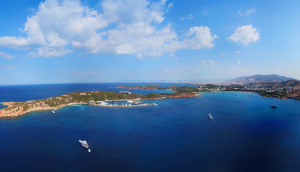XpatAthens
Varoufakis Says He Was And Still Is Prepared To Sign
In his press conference, Finance Minister Yanis Varoufakis said he had been prepared to agree to a deal with creditors that would have given Athens four to six months additional credit in return for putting major new budget policies on hold.
He said the European Commission had put such a suggestion to him before Monday's meeting of euro zone finance ministers but that it had been superseded by a different draft proposal - from Eurogroup President Jeroen Dijsselbloem - that he could not sign because it obliged Athens to extend its current bailout package.
Dijsselbloem's proposal was "highly problematic," he said. "We were offering to refrain effectively from implementing our own program for a period of six months and all we were getting back was a nebulous promise of some flexibility that was never specified," Varoufakis told reporters.
To read more, please visit thetoc.gr/eng
Interview With Emmy Award Winning Actor And Director Yannis Simonides - "Socrates Now"
For detailed event information and to book tickets, please click HERE.
Athens Metro Makes World's Top 10 In Frommer's Travel Guide
To read more, please visit: ekathimerini
Athens’ 17th Century Fethiye Mosque Opens To The Public
August 8 - Summer In The City
Remember to stay connected with us through our weekly newsletter, Facebook, and Twitter!
Surprise 9 - Call For Artists
SURPRISE is a campaign that mobilizes the power of art to offer help in major social issues. The exhibition is a collective effort of the artistic community; since 2009 more than 2000 artists have contributed their works to the campaign.
Each edition of SURPRISE features ~300 artists. All artworks are small format, are offered for the same symbolic price, and are signed at the back. The artist’s identity gets revealed only after the artwork is sold, hence the "surprise".
The next edition of SURPRISE will take place in Athens, Greece, opening 23 November 2018.
Submissions are accepted until 15 November 2018.
Athens On Its Way To Becoming A Leading Leisure Destination
Great Sandwich Spots In Athens
The simple sandwich has long been a lunchtime staple in Greece. However, sandwich shops in Athens have come a long way since the ham, cheese, and butter sandwich that most of us used to eat during the '80s.
These great sandwich spots in Athens promise to offer imaginative and delicious sandwiches that will absolutely satisfy your daytime munchies.
Address: 41 Veikou, Koukaki
Telephone: 210 9226924
Opening Hours: Monday to Saturday from 9:00 to 17:00
Address: 39 Panepistimiou Street (Stoa Pesmatzoglou)
Telephone: 210 3233916
Opening Hours: Monday to Friday from 10:30 to 19:00, Saturday 11:00 to 18:00
Address: 30 Stadiou, Athens (Stoa Korai)
Telephone: 210 3316500
Opening Hours: Monday to Friday from 7:30 to 18:30
5 Greek Masterpieces Found In Museums Abroad
1. Venus De Milo, Louvre Museum, Paris, France
5. Caryatid, British Museum, London, United Kingdom
This content has been sourced and prepared by Codico Lab
Run Messinia: Run For freedom
The Messinian land constitutes a special and historic place for the Greek Revolution of 1821. It is a region where some of the most important battles were given, such as the battle of Sphacteria, in Niokastro, the battle of Maniaki, which cost the life of the Greek hero Papaflessas, but also the naval battle of Navarino which essentially sealed the end of the Revolution and marked the liberation of Greece, resulting in the establishment of the modern Greek state.
Run Messinia is an ultramarathon race of a total distance of approximately 421 kilometers, a tribute to the important events and unforgettable battles of the heroes of 1821. At the beginning of March 2021, during the “Run for Freedom” edition, 10 runners will attempt to run 10 long distances, in 10 days, crossing historical places and monuments of Messinia, which are related to the Greek revolution.
10 runners - 10 marathons in total - 10 days!
Every day, a total of 10 runners will participate in each race. The ambassador of the Run Messinia - Run for Freedom will be the remarkable Greek-American ultramarathon runner Dean Karnazes, one of the 100 most influential people in the world, according to TIME magazine. Karnazes will run all 10 races, in 10 consecutive days. At this point, we should note that a lot of American volunteers fought heroically alongside Greeks during the Greek Revolution.
In the context of his participation in this historic ultra marathon, Karnazes stated: “As a proud Greek-American, it is a great honor to be part of this historic undertaking which recognizes and celebrates Greek independence on this momentous 200-year anniversary. The run will not be easy, though neither was the Greek fight for freedom”.
Maria Polyzou, the Greek running champion, born in Patras, who won the First Gold Medal in the Balkan Marathon race, the first Greek woman to compete in a marathon at the Atlanta Olympic Games in 1996, the woman who holds the Greek record in the Marathon (2:33:40) and completed the Pheidippides Feat Athens-Sparta-Athens 524km run and eventually an endurance running coach, said about this project: “This is an event that honors the great war of 1821. It is very important that the Greek revolution will be recognized by a race like an ultramarathon and that we will honor the cities from which the revolution began in our own way. I wish you good luck in the event. I am by your side”.
We honor history by running!
The region of Messinia led the Greek War of Independence, with chiefs and politicians originating from the specific area, while their descendants still play a leading role in the political and social life of Greece. On the eve of the 1821 Revolution, where revolutionary upheaval prevailed throughout Greece and mainly in the Peloponnese, with the start of the Revolution already being decided, Messinia contributed with a number of warlords and 2 fighters who had been initiated for the purposes of the Philiki Eteria “Friendly Society”, such as Theodoros Kolokotronis, Grigorios Dikaios or Papaflessas, Nikitaras, Anagnostaras, Papatsonis and many more.
The event honors these great heroes of 1821 who led the War battles to the liberation of Greece. The greatest moment in the history of Messinia and especially of Kalamata was the liberation of the city on March 23, 1821, when the Greek chiefs, with the assistance of the fighters from Mani under the leader Petrobey Mavromichalis, entered the city and liberated it.
In collaboration with the world-famous Peloponnesian ultramarathon runner, Karnazes, the event highlights the values of the heroes who covered long distances on foot with great vigor and self-denial in order to fight and move from city to city, comparing these values with the ones that we find today in the long distance running. After all, running is a sport that was born in Greece. A long-distance race demands much more from the athlete than the shorter distance races, not only physically but mainly psychologically and mentally. This race, taking place in the mountains offers the athlete the opportunity to experience situations that no other road race can offer. The challenge is great, as so is the reward. In Run Messinia, each athlete competes not only with other runners but also with the mountain and nature itself, as well as his own personal boundaries. The event came to highlight the importance of overcoming adversities and never quitting, values synonymous with those of the 1821 Revolution and Greek History in general. As the athletes consider it impossible to achieve the 10 long distances within 10 days, similarly, people considered the result of the Revolution historically impossible.
421km run in Messinian land!
The event aims to highlight the history and feature both culturally and touristically all the areas associated with the Greek Revolution in Messinia. The starting point of “Run for Freedom” will be Areopoli. Runners will have the opportunity to pass through historical places of Messinia such as Kardamyli, Verga, Kalamata, Nedousa, Poliani, Skala, Neochori, Katsarou, Solaki, Meropi, Loutro, Diavolitsi, Kallirroi, Ramovouni, Maniaki, Kato Minagia, Koroni, Methoni, Neokastro, the village of Kremmidia, Schinolakka, Paleokastro and of course to finish at the historic Pylos.
Messinian ultramarathon runner Vassilis Koumanakos, who has completed the “Marathon de Sables” 260km race in the Sahara desert, said about his participation in Run Messinia: “It is a special honor to run in the footsteps of great warriors and visit their dens, which were the strongholds of the Greek national liberation war of ‘21. What we will remember is that FREEDOM is not just a word in our national anthem, but it is a situation for which we must fight every day. And this struggle determines our Fate”.
Participations in the race will be by invitation only, while very few spots will open to the public. The event will be held in accordance with the strict health protocol and the approval of the Health Scientific Committee of the General Secretariat of Sports, with respect to the Covid-19 pandemic conditions. Active Media Group has undertaken the event’s Sports Production. More information on the dates, schedule, routes and details of Run Messinia will be announced in the upcoming weeks.













